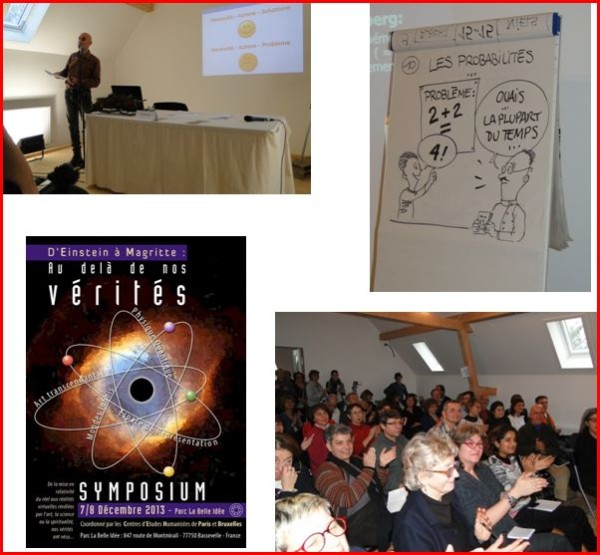On December 7 and 8 2013 the Centers for Humanist Studies of Paris and Brussels were very pleased to organise their first Symposium in the beautiful settings of the Park of Study and Reflection La Belle Idée, France. It was a well attended occasion with panelists and participants from France, the United Kingdom, Germany, Switzerland, Belgium, Spain, Italy, Mexico and the Netherlands.
During the two days, presentations were interspersed with walks around the park, entering via the portal to encounter then the monolith, well rooted in the soil but launched towards the stars, a fountain of energy, beautiful old trees and two buildings: the Centre of Work where we had our breaks and meals, and the Centre of Studies dedicated exclusively to research and study.
Here, as in around fifty other parks in the world, we can find peace and tranquility to carry out our most profound search and research, in the midst of a noisy and often difficult life.
Here we can walk, dream, think, share our thoughts, and share our concerns and aspirations.
Parks are conducive to meditation, diving into oneself as well as into questioning the world and (sometimes) our own lifestyle . They promote the emergence of new ideas and best feelings followed by generous actions. They allow everyone to feel joyful, more useful to others and free.
The title of this symposium “From Einstein to Magritte: beyond our truths” is a tribute to all those who, often in areas that are generally considered incompatible, but certainly inspired in the same way, reach out to construct a new understanding of reality and a new outlook on the world.
This title is also a summary of our latest observations: today, scientific discoveries, new technologies, socio-political changes and economic upheavals are extremely fast and unpredictable. Ideologies, religions, systems of governance, modes of relationship between citizens and institutions, and between individuals themselves have become ineffective in this changing world. Traditional conceptualisations of country, state, labour, family and interpersonal relationships are being changed, not always in a positive way, by the emergence of the first planetary civilization in human history. Intercultural clashes, the overexploitation nearing exhaustion of traditional raw materials, increasing population and urbanization, the possibility of climatic disasters or large-scale nuclear dangers, and the economic crisis engender much concern and insecurity.
However, the possibility of access to and rapid dissemination of all types of information, networks and virtual forums, the energy gained, provided by new technologies, increasing life expectancy in better conditions, among others, contribute to the emergence of a new sensibility that aspires to be an active force for change and builder of a new world.
In this new world, a new conception of the human being is needed. An understanding that ends the age old one of so-called “rational animal” and recognises its intention launched towards increasing humanisation.
In this context the proposals made by the Argentinean thinker Mario Rodriguez Cobos (Silo) are both useful and welcome:
– To consider human beings and their development as the central value,
– To respect the freedom of ideas and beliefs,
– To promote equal rights and opportunities for all,
– To reject all forms of violence and discrimination,
– To develop knowledge beyond what is considered the absolute truth.
Panelists presenting their work at the Symposium, whether scientists, artists or researchers of spiritual truths, or all three at once, each helped us review recent discoveries, current trends, their potential projections and their usefulness for human development.
We thank them for taking their personal time and own resources to be present both days, in this truly exceptional event!
Finally, in Greek, the word symposium means “banquet”, and that’s why the opening statement wished everybody bon appétit!
Pressenza will initiate a series of articles, some following the presentations literally, some as a summary to share the high quality, spirit of enquiry and sense of humour that made of this Symposium a truly remarkable event.










